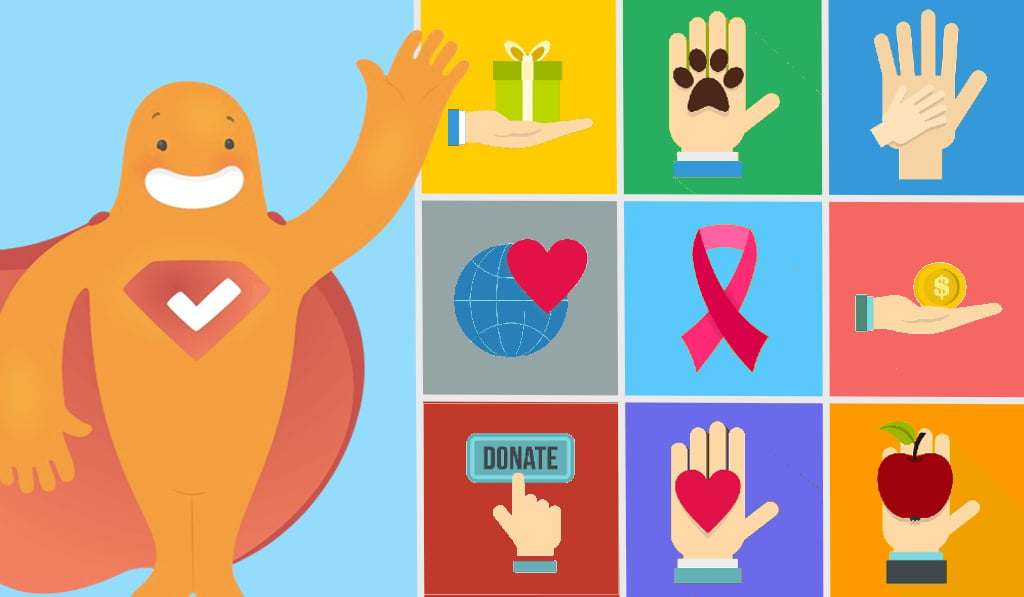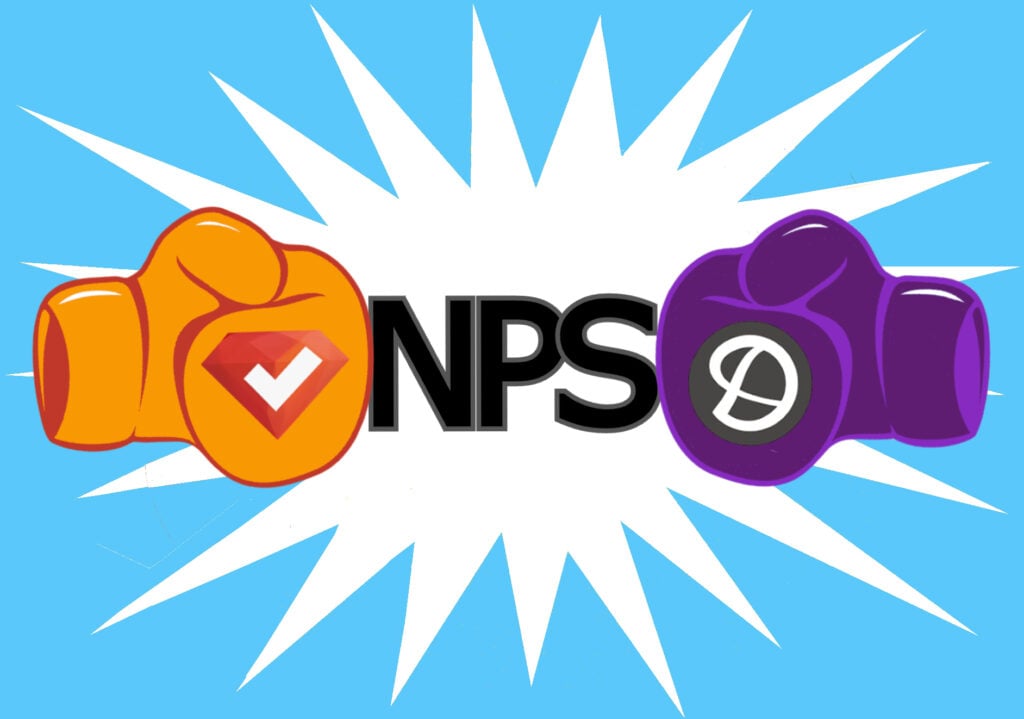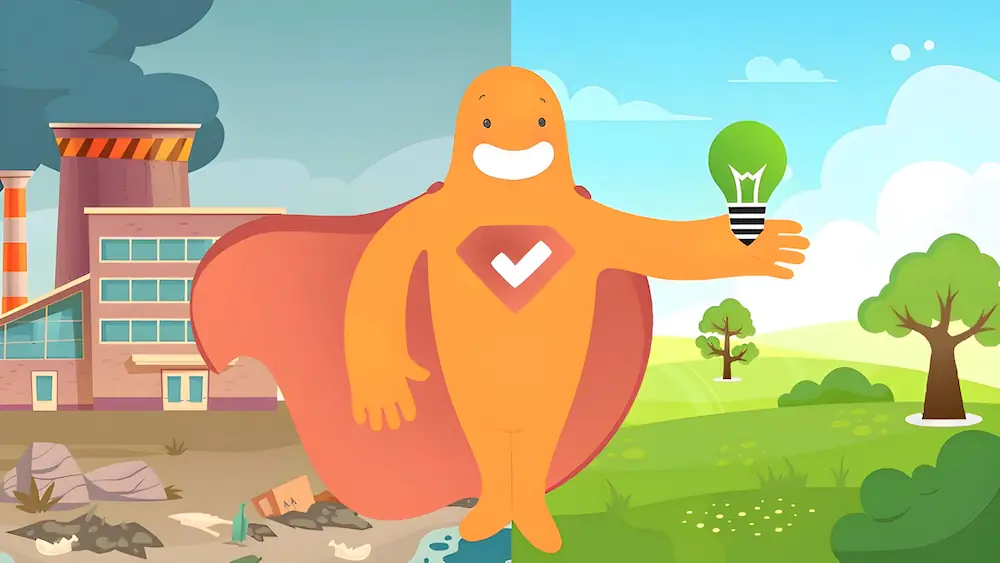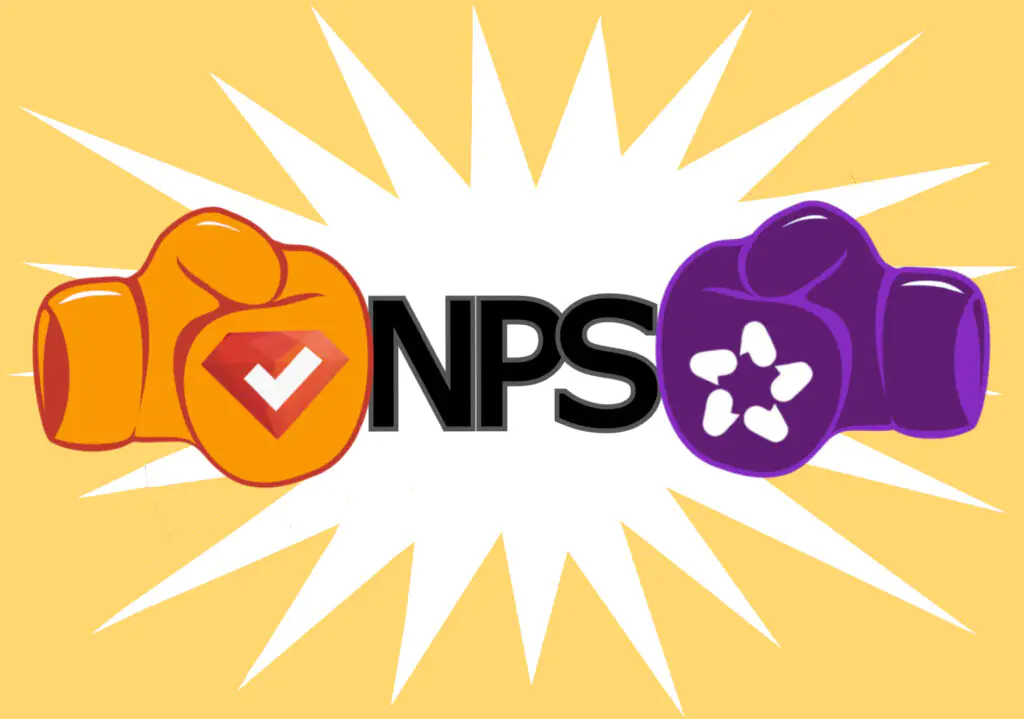“This blog is sponsored by SurveyLegend!”
We’re used to seeing companies sponsor things. Sponsorships have been an essential part of marketing strategies across many industries for years. Whether a company is sponsoring an event, a charity, sports teams – anything, really – it helps to increase brand visibility and engage with target audiences. But how do you measure the effectiveness of a sponsorship? This is where sponsorship surveys come into play.
Create your FREE Sponsorship Survey Now!
What Are Sponsorship Surveys?
Sponsorship surveys are used to gauge the effectiveness of a sponsorship initiative. These surveys gather feedback from event attendees, fans, or participants about their perceptions of the sponsor, the event, and the overall experience. They aim to collect data that allows sponsors to understand how well their efforts are resonating with the audience.
Unlike traditional marketing metrics (like reach, impressions, and click-through rates), sponsorship surveys provide qualitative and quantitative insights that reflect the audience’s experience and perception. They offer valuable feedback on brand association, awareness, sentiment, and the overall impact of the sponsorship.
Why Should You Use Sponsorship Surveys?
The ultimate goal of any sponsorship is to drive return on investment (ROI). Sponsorship surveys help companies understand how effective their investment has been by assessing brand recall, recognition, and affinity. These insights allow sponsors to calculate ROI beyond just direct sales or leads, taking into account long-term brand value.
Sponsor surveys also give brands an opportunity to better understand how their audience feels about their alignment with an event, charity, or company. Does the audience see the partnership as authentic, or does it feel forced? Do attendees think the sponsor added value to the event? These surveys will clue a company in as to whether the partnership is strengthening the brand in the eyes of the consumer, having no impact, and in some cases, hurting it.
Feedback from surveys can also help sponsors fine-tune their strategies for future partnerships. For example, if a particular demographic isn’t responding positively, sponsors can adjust their messaging, targeting, or even the types of events they sponsor. Sponsorship surveys provide actionable insights for improvement.
Lastly, when renewing sponsorship deals or entering into new agreements, sponsors need evidence to justify their investment. Data gathered from these surveys can be used in these negotiations to show the tangible impact the sponsorship had on audience engagement and brand perception.
Five Benefits of Sponsorship Surveys
There are a number of benefits to be had by creating a sponsorship survey. They can be conducted before the sponsorship, to see what people think about the alignment, or after, to gauge their reaction to the partnership.
1. Data-Driven Decision-Making
One of the biggest benefits of using sponsorship surveys is the ability to make data-driven decisions. Surveys provide concrete insights that allow sponsors to make informed choices about future partnerships, marketing strategies, and audience targeting.
2. Enhanced Audience Engagement
When you ask for feedback, audiences feel heard and valued. By incorporating surveys into your sponsorship strategy, you’re fostering a stronger connection with your audience, increasing the likelihood of brand loyalty and future interactions.
3. Customization of Sponsorship Strategies
Not all sponsorships are created equal, and the results of one could be very different from another. Surveys allow sponsors to customize their approach based on specific audience needs and responses, ensuring better engagement and more tailored messaging in future sponsorships.
4. Improved Sponsorship Value
By understanding what works and what doesn’t, sponsors can improve the value of their sponsorships, making them more effective and impactful. This ensures that both the sponsor and the event organizer benefit from a more meaningful partnership.
5. Competitive Edge
Sponsorship surveys can provide insights into the competition. If competitors are sponsoring similar events or audiences, surveys can help you understand how your brand stacks up and identify opportunities for differentiation.
Create your FREE Sponsorship Survey Now!
Sponsorship Survey Questions
Below are some essential questions to consider when creating your sponsor survey.
Brand Awareness and Recall
- Were you aware of the sponsor before this event?
- Do you recall seeing or hearing about the sponsor during the event?
- What do you associate the sponsor with after the event?
These questions assess the effectiveness of the sponsorship in increasing brand awareness and recall. A positive response here suggests that the sponsorship successfully reached the audience.
Perception of the Sponsorship
- Do you think the sponsor is a good fit for this event?
- How would you describe your perception of the sponsor after the event (more positive, negative, or the same)?
- Did the sponsor enhance your experience at the event?
Here, you can gauge how the audience feels about the alignment between the sponsor and the event. If the sponsor is well-matched, the audience is more likely to develop a positive brand association.
Purchasing Intentions
- Are you more likely to consider the sponsor’s products or services after this event?
- Did you interact with the sponsor’s booth, promotions, or representatives during the event?
- How likely are you to recommend the sponsor’s products or services to others?
These questions help you understand how the sponsorship influences purchase behavior and intent, which is essential for assessing the long-term impact on sales.
Sponsorship Survey Example
Using some of the questions above, here’s a look at a sponsor survey created with SurveyLegend. You’ll see that it is branded with the event logo at the top (a musical event), includes an appropriate background image, and uses a variety of types of survey questions to keep respondents engaged and improve survey response rates.
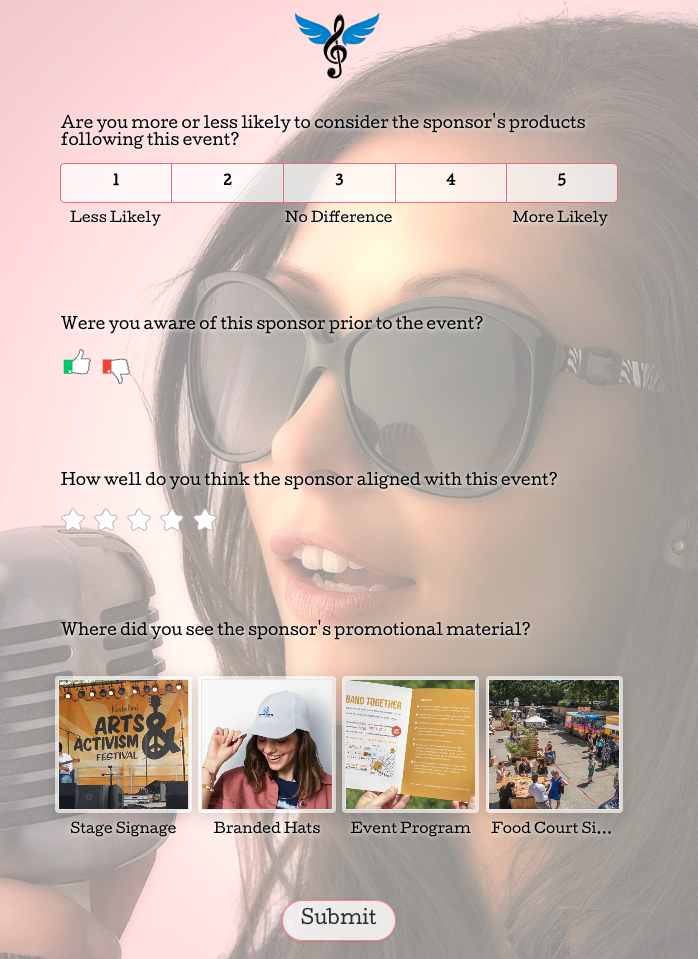
Conclusion
Sponsorship surveys are a valuable tool for companies that want to maximize the impact of their partnerships. They offer insights that go beyond traditional marketing metrics, providing a deeper understanding of audience sentiment, brand perception, and the overall success of a sponsorship. By asking the right questions and leveraging the insights gathered, sponsors can optimize their strategies, justify their investments, and ultimately enhance their connection with the audience. Ready to create your sponsor survey? Start today with SurveyLegend!
Have you participated in a sponsorship survey before? Has your company ever sponsored an event or used an event survey? Would you have liked to have more insightful information about your ROI? Let us know in the comments.
Create your FREE Sponsorship Survey Now!
Frequently Asked Questions (FAQs)
Sponsorship surveys help companies measure the effectiveness of their sponsorship efforts by gathering feedback on brand awareness, audience engagement, and overall perception. These surveys provide valuable insights that guide future sponsorship decisions and assess the return on investment.
Companies sponsor events, teams, or causes to increase brand visibility and reach a wider audience, often aligning themselves with activities that resonate with their target market. Sponsorships also help build goodwill and enhance brand reputation by associating the company with positive experiences or social causes.
The cost of a sponsorship varies depending on factors like the size of the event, the level of exposure, and the benefits provided (such as advertising rights or exclusive partnerships).

